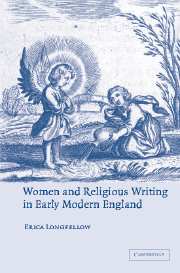Book contents
- Frontmatter
- Contents
- Acknowledgements
- Abbreviations
- Note on transcription and citation
- Introduction
- 1 ‘Blockish Adams’ on mystical marriage
- 2 Ecce homo: the spectacle of Christ's passion in Salve deus rex judæorum
- 3 Serpents and doves: Lady Anne Southwell and the new Adam
- 4 Public worship and private thanks in Eliza's babes
- 5 Anna Trapnel ‘sings of her Lover’
- 6 The transfiguration of Colonel Hutchinson in Lucy Hutchinson's elegies
- Conclusion
- Bibliography
- Index
- Index to scripture passages
3 - Serpents and doves: Lady Anne Southwell and the new Adam
Published online by Cambridge University Press: 22 September 2009
- Frontmatter
- Contents
- Acknowledgements
- Abbreviations
- Note on transcription and citation
- Introduction
- 1 ‘Blockish Adams’ on mystical marriage
- 2 Ecce homo: the spectacle of Christ's passion in Salve deus rex judæorum
- 3 Serpents and doves: Lady Anne Southwell and the new Adam
- 4 Public worship and private thanks in Eliza's babes
- 5 Anna Trapnel ‘sings of her Lover’
- 6 The transfiguration of Colonel Hutchinson in Lucy Hutchinson's elegies
- Conclusion
- Bibliography
- Index
- Index to scripture passages
Summary
In recent years scholars have begun to realise that it is not only misogynist perceptions that make it difficult for us to recover early modern women writers. As the example of Aemilia Lanyer demonstrates, we must also be wary of feminist ideals of the woman writer. As Margaret Ezell first argued, the earliest attempts to understand early modern women writers were hampered by narrow definitions of both femininity and writing. A critical stance that privileged outspoken ‘public’ print writers – a modern feminist ideal – slighted or ignored a wide variety of voices from the early modern period which did not display such proto-feminist characteristics. The fault was, of course, not in the texts but in the criticism: ‘If these texts refuse to yield up feminism,’ Danielle Clarke writes in a recent essay, ‘it may also be the case that feminism, as it has been applied, does not yield up the texts.’
The work of Lady Anne Southwell (1574–1636) stands between the two critical poles. Her verse is unabashedly outspoken and even radical in its gender politics, anatomising the constraints placed on both women and men when some early modern gender ideals were taken to their extreme. On the other hand, her manuscript religious verse – itself among the most difficult of genres to reconcile with modern feminist ambitions – never strays from conventional Biblical orthodoxies, and appears to have been ‘corrected’ by her husband.
- Type
- Chapter
- Information
- Women and Religious Writing in Early Modern England , pp. 92 - 121Publisher: Cambridge University PressPrint publication year: 2004



